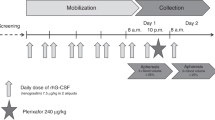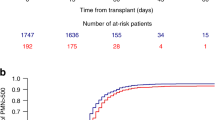Abstract
We retrospectively analysed the factors that influenced rate of haemopoietic recovery (HR) in 243 patients after transplantation with chemotherapy-mobilised autologous peripheral blood progenitor cells (PBPC). Approximately half the patients also received haemopoietic growth factors (HGF) for mobilisation. Conditioning for transplantation was with either chemotherapy alone or chemotherapy plus total body irradiation (TBI). Median time to recovery of granulocytes ⩾0.5 × 109/l was 13 days (range 7–93 days) and of platelets ⩾50 × 109/l 14 days (7–440). Speed of HR was greater, both for neutrophils and platelets for patients who received more rather than less CFU-GM than our median value of 18.9 × 104/kg (P < 0.0001 in both instances) and more rather than less cd34-positive cells than our median value of 8.8 × 106/kg (P < 0.0001 and P < 0.0005, respectively). for granulocyte recovery, in the multivariate analysis the dose of infused cfu-gm (P = 0.05) and the use of HGF for both mobilisation and post-transplantation (P < 0.0014) were significant positive factors. for platelet recovery in the multivariate analysis the dose of infused cfu-gm (P < 0.0016) was a positive factor. the use of busulphan and of tbi were significant adverse factors for rate of platelet recovery (P = 0.005 and 0.0004, respectively). When compared with non-HGF-mobilised PBPC, HGF-mobilised PBPC reduced the number of days of hospitalisation (28 vs 24, P = 0.0001) and of treatment with intravenous antibiotics (15 vs 11, P = 0.0004). These findings emphasise the importance of cell dose in accelerating haemopoietic recovery after autologous blood stem cell transplantation.
This is a preview of subscription content, access via your institution
Access options
Subscribe to this journal
Receive 12 print issues and online access
$259.00 per year
only $21.58 per issue
Buy this article
- Purchase on Springer Link
- Instant access to full article PDF
Prices may be subject to local taxes which are calculated during checkout
Similar content being viewed by others
Author information
Authors and Affiliations
Rights and permissions
About this article
Cite this article
Lowenthal, R., Fabères, C., Marit, G. et al. Factors influencing haemopoietic recovery following chemotherapy-mobilised autologous peripheral blood progenitor cell transplantation for haematological malignancies: a retrospective analysis of a 10-year single institution experience. Bone Marrow Transplant 22, 763–770 (1998). https://doi.org/10.1038/sj.bmt.1701435
Received:
Accepted:
Published:
Issue Date:
DOI: https://doi.org/10.1038/sj.bmt.1701435
Keywords
This article is cited by
-
The impact of CD34+ cell dose on engraftment after SCTs: personalized estimates based on mathematical modeling
Bone Marrow Transplantation (2014)
-
Graft clonogenicity and intensity of pre-treatment: factors affecting outcome of autologous peripheral hematopoietic cell transplantation in patients with acute myeloid leukemia in first remission
Bone Marrow Transplantation (2005)
-
Effect of peripheral blood progenitor cell dose on hematopoietic recovery: identification of minimal progenitor cell requirements for rapid engraftment
Bone Marrow Transplantation (2004)
-
Factors influencing hematopoietic recovery after autologous blood stem cell transplantation in patients with acute myeloblastic leukemia and with non-myeloid malignancies
Bone Marrow Transplantation (2002)
-
A European reference protocol for quality assessment and clinical validation of autologous haematopoietic blood progenitor and stem cell grafts
Bone Marrow Transplantation (2001)



